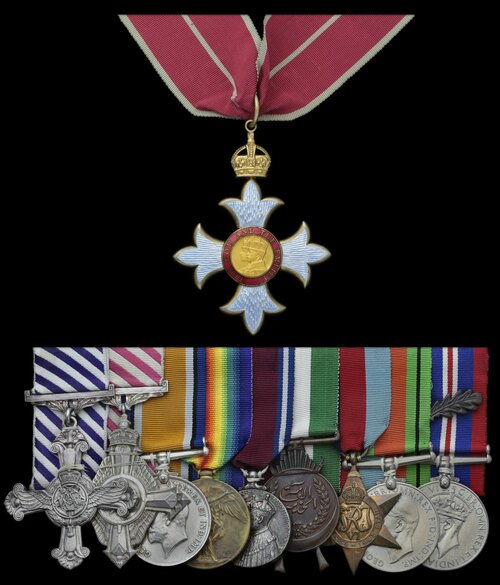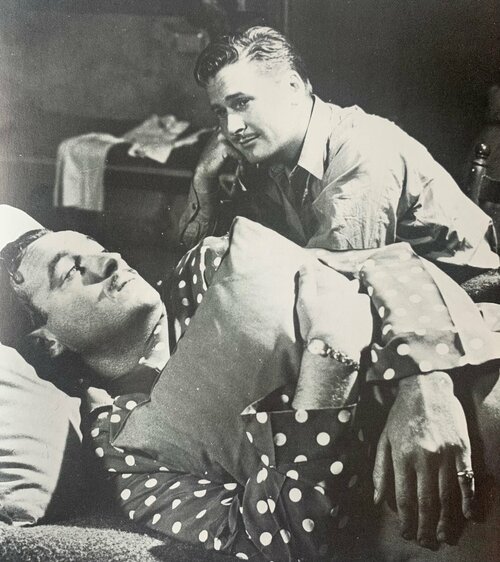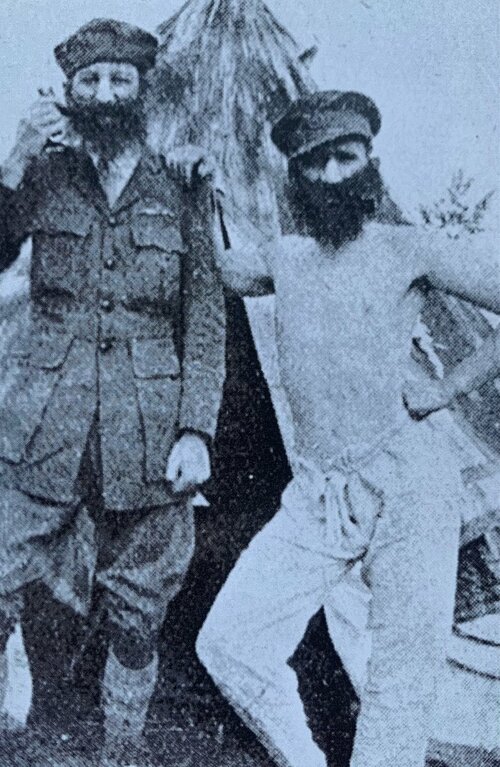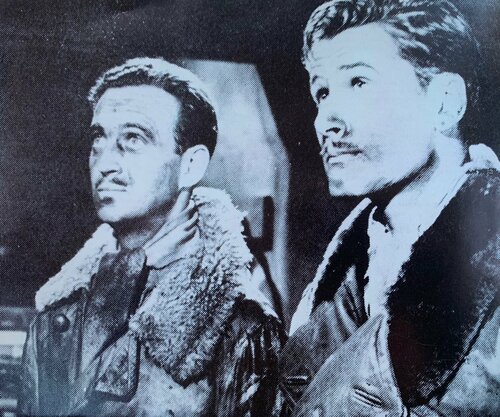Auction: 22001 - Orders, Decorations and Medals
Lot: 533
''''Congratulations. Forwarding Clean Pair of Pants."
The Telegram sent by his comrades after having made history in becoming the first Test Pilot to save his life by parachute.
The superb 1946 C.B.E., inter-War Iraq 1924 Operations D.F.C., and Test Pilot's A.F.C. group of ten awarded to Air Commodore S. L. G. “Poppy” Pope, Royal Air Force test pilot and Great War ‘Ace’ with No. 60 Squadron Royal Flying Corps
During the Great War 'Poppy' had the misfortune to be wounded and forced down in his SE5a whilst wearing a pair of red and white spotted pyjamas - an incident re-enacted by David Niven in Dawn Patrol
The Most Excellent Order of the British Empire, C.B.E. (Military Division) 2nd Type Commander's neck Badge, silver-gilt and enamel; Distinguished Flying Cross, G.V.R.; Air Force Cross, G.V.R.; British War and Victory Medals (Lieut. S. L. G. Pope, R.F.C.); Jubilee 1935; Iraq Active Service Medal, without clasp; 1939-45 Star; Defence and War Medals 1939-45, with M.I.D. oak leaf, mounted court-style for wear in this order by Spink & Son, generally good very fine (10)
Provenance:
Spink Medal Circular, No. 8, December 1997, when this Lot appeared on the back cover.
C.B.E. London Gazette 1 January 1946. The following recommendation is taken from Air Ministry records:
‘Acting Air Commodore S. L. G. Pope, D.F.C., A.F.C., No. 53 Base. This officer was appointed to command an operational station in October, 1943, and in February, 1944, took over command of No. 53 (Operational) Base. He has a strong personality and has proved to be a most capable and efficient base commander who has successfully organised the squadrons under his command to a high standard. His efforts and ability have contributed much towards the success of Bomber Command’s operations.’
D.F.C. London Gazette 28 May 1926:
‘For gallant and distinguished service in connection with the operations in Iraq during the period September to November 1924.’
The following recommendation is taken from Air Ministry records:
'Flight Lieutenant Pope constantly led patrols with great fearlessness and determination, often at low altitudes through mountain passes infested with the enemy, and frequently under severe fire. He carried out over 90 hours’ operational flying in one month and at all times set a splendid example of courage and zeal.’
A.F.C. London Gazette 1 March 1929. The following recommendation is taken from Air Ministry records:
‘Flight Lieutenant Pope commands a flight in No. 22 Squadron, which is under the technical administration of the Aeroplane and Armament Experimental Establishment. For nearly two years he has been engaged in the daily work of testing high speed single-seater machines, and although the work is often of a hazardous nature, he always shows unflagging zeal and energy, thereby setting a splendid example to all.’
Sydney Leo Gregory Pope - or Poppy to his friends and comrades - was born in Dublin on 27 March 1898 and educated at Marist College, Dublin, and St Joseph’s College, West London. He enlisted as Private No.5781, Inns of Court O.T.C., on 23 August 1915, until he was discharged as a Lance Corporal on appointment to a Commission in the Royal Flying Corps on 3 June 1916. In 1917 he served with No. 60 Squadron in France during the summer, flying Nieuport Scouts. During June he claimed two victories with this type, but the following month converted to SE5s, soon followed by SE5As. His first victory with the new aircraft was gained on 16 September, and on 8 November he claimed two two-seaters. His final victory on 11 November brought his score to six. His unit history, by Group Captain Scott recalled:
'This was a good Pilot and a popular Officer, who for some reason was a long time befre he began to get Huns, but, having once found his form, became a very useful and formidable fighter.'
It was on 18 November 1917 that he came to grief during an aerial combat in which he had gone to the skies in his pyjamas, in which he was wounded and forced to land near St Julien. The incident was re-enacted by David Niven in the popular pre-War film Dawn Patrol, as he recalled in his autobiography The Moon's a Balloon:
'At one point I was hungover and went up in my Sopwith Camel in red and white spotted pyjamas. I was shot down and fell in a lake. The Officer's Mess was plunged in gloom at the loss when I suddenly walked in, still in pyjamas with an armful of champagne bottles. This was a true incident that had happened near Arras to a certain Flying Officer Pope.'
He remained in the R.A.F. after the war and served in Iraq with No. 8 Squadron in April 1922, seeing further service with No. 55 Squadron until 1924, winning the Distinguished Flying Cross during active operations in 1924 which required almost constant work in low altitude mountain pass patrols which often see him come under heavy fire.
In February 1927, Pope joined No. 22 Squadron at the Aeroplane and Armament Experimental Establishment, based at Martlesham Heath, where he became the first R.A.F. Test Pilot to save his life by parachute. Whilst at the Parnall factory at Yate, testing a Parnall Pippit, a single-seater fighter undergoing acceptance trials, Pope felt a twitch when at 800 feet. He glanced over his shoulder and was just in time to see the rudder and fin floating away in mid-air behind him. Deciding that the time had come for him and the Pippet to part company, pope jerked the throttle shut, pulled the nose up and reached down to undo the straps of his Sutton harness. For several long precious seconds he fumbled for the string attached to the pin, unable to bend his head because he was strapped in so tightly. At last his fingers grasped a length of string and he pulled hard. Nothing happened. Nor the second time, but on the third attempt the string came away. But the straps of his harness did not, and only then did he realise that he had been pulling the string which held a pencil to the knee pad on which he scribbled his test data! Frantically now he groped for the pin that secured the four straps and succeeded when only 300 feet from the ground. After a struggle he managed to force his bulky frame through the cockpit opening and free of the aircraft only to find that the ripcord handle was not where it was meant to have been. He had somersaulted and was falling feet-first; below him he could see a row Africa Star tall oaks coming up fast. In that same split second he saw the ripcord ring hanging by his leg - it had slipped from its sheath. He reached down, gave it a despairing tug and his chute blossomed out above him with a bump. As he reached up to grasp the lift webs his feet slashed through the top branches on to the ground.
“The people over at the aerodrome hadn’t seen me get out,” Pope said. “When they came running over they expected to find me in the wreckage. Instead I was running round the field like a madman, making sure that my back, which had received a severe jar, was in working order. The only visible injuries were two scratches on my ankle.” That evening he received a characteristic telegram from his colleagues at Martlesham. “Congratulations,” it read, “Forwarding clean pair of pants." His A.F.C. followed soon after.
Promoted Squadron Leader in February 1932, Pope took up command of No. 54 Squadron and went up to Staff College. Promoted Wing Commander in April 1937, he took up several appointments as a Naval Co-operation Officer, including serving aboard Furious.
Upon the outbreak of the Second World War, Pope took command of No. 226 Squadron and took his Squadron to France - now an Acting Group Captain - in May 1940. The Squadron took lunch at Harwell and thence proceeded in their 15 Fairey Battles to Rheims, with Pope at the head. As fate would have it, Pope went on to meet David Niven at a cocktail party held by Noel Coward in Paris shortly before the Fall of France. Niven recalls the meeting:
'The apartment was filled with a mixture of French and British diplomats and a sprinkling of Officers in uniform. One of them, a very tall Group Captain, cornered me and introduced himself by the name of Pope. "It might amuse you but the character you played in Dawn Patrol was me! - and I still have the pyjamas.'
Niven asked his new-found friend for some advice on how best to join the Royal Air Force only to be shocked to learn that at 29 years of age he was already too old to be trained as a Fighter Pilot. Pope did, however, get him an appointment with Paris air Attache John Acheson, the latter arranged for Niven to board a mail plane back to England. Pope followed soon after in order to take up Command of RAF Leuchars.
Pope thence proceeded to Canada in December 1941 as an OTU Commander, coming back to England in 1943 in order to take up an appointment at HQ Bomber Command. Promoted Air Commodore in 1944, 'Poppy' retired in 1946, having flown no less than 150 aircraft types. He retired to Sidney, British Columbia, became a keen fisherman and died on 5 November 1980; sold together with a quantity of copied research and extracts.
Subject to 20% VAT on Buyer’s Premium. For more information please view Terms and Conditions for Buyers.
Sold for
£7,000
Starting price
£5200











